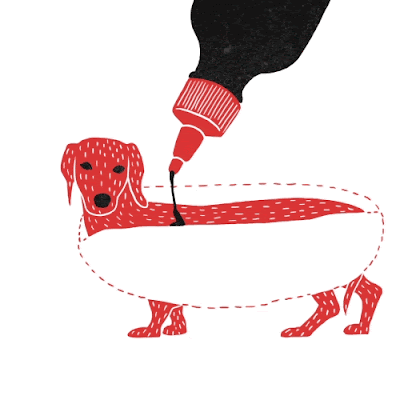From NPR! 抗生素濫用!美國FDA仿效荷蘭模式,抗生素少往動物身上打。 雖然硬性文章不見得有趣,但學習英文偶爾也應該熟讀一篇深度文章,替自己累積實力。
 |
| 在美國有超過七成的抗生素不是用在人身上,而是飼養的牲畜。抗生素的濫用雖然備受重視,但因為牽扯的利益範圍太廣了,全面禁用幾乎不可能。 下面這篇報導值得我們深思。 在歐美地區, 牲畜使用抗生素最少的國家, 全球排名前五名的國家分別是: 1. 挪威 2. 愛爾蘭 3. 紐西蘭 4. 瑞典 5. 澳洲 |
 |
| 上面這張圖表說明了具有抗藥性的細菌是如何廣泛地散布。 基本上,動物跟人類只要服用抗生素,體內就會發展出抗藥性。 動物身上具有抗藥性的細菌會殘留在體內,傳播的途徑有 1. 烹煮或處理肉類的時候稍有不慎,很容易傳給人類。 2. 具有抗藥性的細菌透過牲畜的糞便傳播,一但糞便被當成肥料,很可能沾染作物傳給人。 3. 動物糞便中具有抗藥性的細菌與農作物,一但讓人類吃下肚後,很有可能就會傳播給人。 再來就是人傳人的狀況: 1. 人體內具有抗藥性的病毒會傳給家人。 2. 住院治療的病人體內若有具有抗藥性的細菌,這些細菌會傳給醫護人員或是在醫院的人,這包含了探病、看病的人還有住院的其他病人。 下載聲音檔請點我 下載填空卷請點我 下載解析版請點我 |
From NPR
FDA
Launches Voluntary Plan To Reduce Use Of Antibiotics In Animals
From NPR News, this is ALL THINGS
CONSIDERED. I'm Audie Cornish.
ROBERT SIEGEL, HOST:
And I'm Robert Siegel. The Food and Drug
Administration 美國食品藥物管理局FDA announced a plan today to cut back減少 the use of antibiotics抗生素 on farm
animals. If it works, within three years, pork and chicken producers will no
longer use antibiotics to make their animals grow faster.
But NPR's Dan Charles reports, the
plan has its
share of skeptics非常令人質疑 because
it relies on依靠 voluntary cooperation自願配合.
DAN CHARLES, BYLINE: Pork and
chicken producers use antibiotics to fight off抵禦/對抗 disease, but also to help
their animals grow faster and use feed more efficiently吃飼料後能長得更好. The FDA's been worried about
the
overuse of antibiotics on the farm for decades. The reason is, the
more these drugs are used, the more quickly bacteria in the animals will develop resistance
to發展出抗藥性 them.
Some of these microbes微生物microorganism can infect感染 people, too, and then the antibiotics won't work.
Thirty-five years
ago, the agency proposed banning禁止 the use
of some antibiotics as growth promoters促進成長劑, then it withdrew the proposal. Today, Michael Taylor,
the FDA's deputy
commissioner副局長 for
food, announced a new approach.
MICHAEL TAYLOR: We must find a practical and effective務實與有效的 way to limit the use of these animal drugs to
treating, controlling and preventing specific disease.
CHARLES: The FDA is starting some intensive
consultations密集諮詢 with the
drug industry and veterinarians. The agency says it has persuaded drug companies
to stop listing more efficient production as an acceptable use of antibiotics
or antimicrobials抗微生物 in farm animals. And no drugs
will be used
on animals without a veterinarian in charge.負責
But all this is voluntary. The
reason, Taylor says, is the voluntary route is more practical and effective
than trying to legally ban hundreds of different drugs and defend
each one in court上法院.
CHARLES: And we don't even need to
go through that, Taylor
Scott Hurd, a veterinarian at Iowa
State University and a former USDA official, says this voluntary approach will change
farmers'
practices作法.
SCOTT HURD: Because, even though
it's called a guidance引導守則, essentially, people take it
as the
gospel福音 and as the law, so growth promotion usages will go
away.
CHARLES: Now, some people don't buy
that不相信. The Natural Resources
Defense Council美國自然資源保護委員會
called today's FDA action make believe reform自欺欺人的改革. Skeptics懷疑者 say the industry has shown little interest in對…不趕興趣 change. Also, what's truly necessary use of antibiotics is a matter of
interpretation針對某個議題或是事物,每個人自有不同解釋.
Consider what happened in parts of Europe when the European Union banned the use of
antibiotics for the purposes of animal growth promotion in 2006.
Dik Mevius, a leading
expert
on…的專家
antibiotic
resistance at the University of Utrecht荷蘭烏特勒支大學(歷史最優久的一所學府) in the
Netherlands, says meat producers there simply started using more antibiotics
for what was still allowed, preventing disease or treating it.
DIK MEVIUS: So we saw a more or less
doubling of those drugs that were used for therapy, so the total exposure這邊指的是使用量(此字原意是曝光) of animals to antibiotics remains virtually the same
from 1999
to 2007.
CHARLES: After that, though, and
after lots of pig farmers realized they and their families were carrying
antibiotic resistant strains of disease-causing bacteria體內的細菌出現抗藥性, the Dutch government clamped down hard以嚴格的方式去執行或是取締. Each farm now has to report
how often it uses antibiotics for all purposes. Farms that used a lot are told
specifically what they need to do to cut back減少. The government is funding lots of research into farming
methods that don't require antibiotics and antibiotic use is now coming down.減少
Laura Rogers with the Pew Campaign
on Human Health and Industrial Farming says the FDA
may need to do something similar so the prescriptions aren't simply
rewritten to call them disease prevention drugs.這邊是指專家建議美國食品藥物管理局,也要仿效荷蘭模式,不要讓業者以預防疾病的名目濫用抗生素。
LAURA ROGERS: The loophole漏洞 that does remain is these
uses of the drugs for prevention purposes and they are used in mass
quantities以預防疾病為目的抗生素或藥物的使用量極大, so that's really going to be where FDA's going to have
to dig in切入點.
CHARLES: The FDA says it will see
how well this voluntary program works over the next three years. If it
doesn't seem to be effective, the agency will have to try something different.
Dan Charles, NPR News.










留言
張貼留言